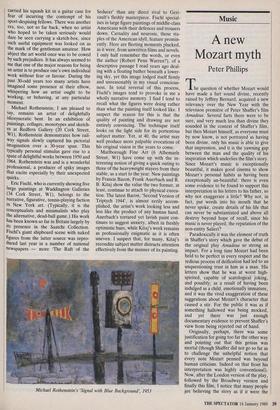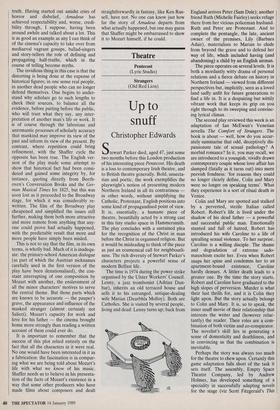M usic
A new Mozart myth
Peter Phillips
The question of whether Mozart would have made a fart sound divine, recently raised by Jeffrey Bernard, acquired a new relevancy over the New Year with the television premiere of Peter Shaffer's film Amadeus. Several farts there were to be sure, and very much less than divine they sounded in the context of Shaffer's film, but then Mozart himself, as everyone must by now know, is not portrayed as having been divine, only his music is able to give that impression, and it is the yawning gap between the man and the quality of his inspiration which underlies the film's story. Since Mozart's music is exceptionally beautiful, it makes good cinema to show Mozart's personal habits as having been exceptionally un-beautiful: there is even some evidence to be found to support this interpretation in his letters to his father, so why not exaggerate a little? Why not, in fact, put words into his mouth that he never spoke, create details of his life that can never be substantiated and above all destroy beyond hope of recall, since his music is never played, the reputation of the non-entity Salieri?
Paradoxically it was the element of truth in Shaffer's story which gave the debut of the original play Amadeus so strong an impact. For a long time Mozart had been held to be perfect in every respect and the tedious process of deification had led to an unquestioning trust in him as a man. His letters show that he was at worst high- spirited, capable of scatological joking, and possibly, as a result of having been indulged as a child, emotionally immature, and it was the vivid exaggeration of these suggestions about Mozart's character that caused a stir. For the public it was as if something hallowed was being mocked, and yet there was just enough documentary evidence to prevent Shaffer's view from being rejected out of hand.
Originally, perhaps, there was some justification for going too far the other way and pointing out that this genius was mortal (though Shaffer did not go so far as to challenge the unhelpful notion that every note Mozart penned was beyond human criticism. Indeed on that front his interpretation was highly conventional). Now, after the London version of the play, followed by the Broadway version and finally this film, I notice that many people are believing the story as if it were the truth. Having started out amidst cries of horror and disbelief, Amadeus has achieved respectability and, worse, credi- bility through, I suppose, having been around awhile and talked about a lot. This is as good an example as any I can think of of the cinema's capacity to take over from mediaeval vagrant gossips, ballad-singers and story-tellers the role of defining and propagating half-truths, which in the course of telling become myths.
The invidious thing in this case is that the distorting is being done at the expense of historical figures; in one sense real people, in another dead people who can no longer defend themselves. One begins to under- stand why scholars go to such lengths to check their sources, to balance all the evidence, before putting before the public, who will trust what they say, any inter- pretation of another man's life or work. It is of course through the laborious and unromantic processes of scholarly accuracy that mankind may improve its view of the past and inform its view of the present. By contrast, where repetition could bring refinement, with the Shaffer cycle the opposite has been true. The English ver- sion of the play made some attempt to show that historical fact had been consi- dered and gained some integrity by, for instance, quoting directly from Beeth- oven's Conversation Books and the Ger- man Musical Times for 1825, but this was soon lost as it proceeded to the Broadway stage, for which it was considerably re- written. The film of the Broadway play cheapened and simplified the issues still further, making them both more attractive and more remote from anything that any- one could prove had actually happened, with the predictable result that more and more people have simply been misled.
This is not to say that the film, in its own terms, is wholly bad. Much of it is inadequ- ate: the primary-school American dialogue (as part of which the Austrian nicknames carefully used in the first version of the play have been denationalised), the con- stant interrupting of one composition by Mozart with another, the enslavement of all the minor characters' motives to serve the central theme. But those parts which are known to be accurate — the pauper's grave, the appearance and influence of the masked stranger (almost certainly not Salieri), Mozart's capacity for work and love for his father — the cinema brought home more strongly than reading a written account of them could ever do.
It is important to remember that the success of this plot relied entirely on the fact that all the characters in it were real. No one would have been interested in it as a fabrication: the fascination is in compar- ing what we are being told about Mozart's life with what we know of his music. Shaffer needs us to believe in his presenta- tion of the facts of Mozart's existence in a way that some other producers who have made films about composers and dealt straightforwardly in fantasy, like Ken Rus- sell, have not. No one can know just how far the story of Amadeus departs from what actually happened, but one may guess that Shaffer might be embarrassed to show it to Mozart himself, if he could.



















































 Previous page
Previous page